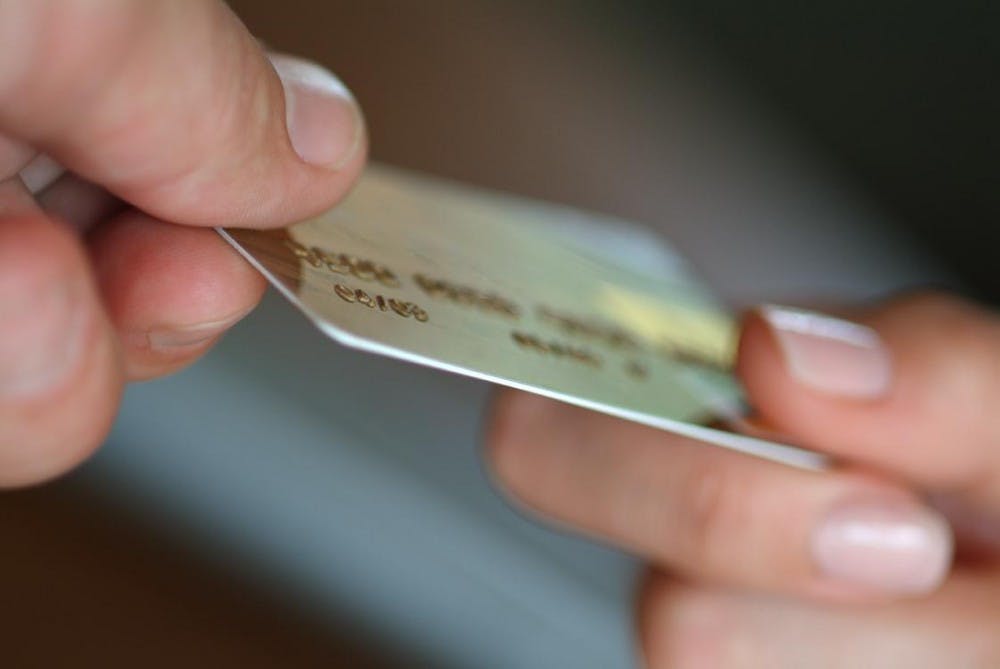Fees for debit card use and the prospect of credit checks inspire a focus on student credit cards
(-- The Beacon)
By Enid Spitz Asst. Copy Editor spitz13@up.edu
Early next year, Bank of America will begin charging $5 monthly for debit card use.
For students, that fee is the price of a Bon Appétit "not so big" salad or round-trip bus fair downtown.
To escape new debit card fees, students have alternatives such as cash or using another type of card: credit cards.
Many companies offer special credit cards tailored to students' needs.
But the world of credit cards, APR financing and credit scores is unknown territory to many college students.
Junior business major Scott Chia just got his first credit card, intending to build his credit for the future.
"I got it for when I want to buy a house or a car someday," Chia said.
A credit score is a number from 300 to 850 based on your credit habits and history. The higher the score, the better, and many companies take this number into account.
"I had never really thought about credit scores until I tried to sign up with Comcast," junior Stasia Uhrhammer said.
When she tried to set up Wi-Fi Internet at her house, Comcast was hesitant based on her lack of credit.
"They told me that I didn't have a credit history and they were going to charge me $50 to set an account up," Uhrhammer said.
It's not just Internet providers that care about credit scores. Future employers, landlords and banks often rely on credit history to evaluate applicants.
Most major banking companies have credit card applications online that require basic personal information as well as employment, education and rental histories. Students can also contact banks about the credit cards they offer.
Chia did not have a problem getting his first credit card directly from his bank.
"I just went over to Bank of America and got it," Chia said.
Student cards, as opposed to regular credit cards, usually require little to no credit history because they have low credit lines. Chia said he also thinks it helped that he was fully employed at the time.
Once you have a credit card, financial experts like those at The Wall Street Journal's Smart Money department recommend building up credit by paying off your bill every month.
If not paid in full, interest will accumulate on the outstanding balance, building up over time.
"The debit fee makes it advantageous to use a credit card, but you run the risk of running up a balance," professor of business James Seal said.
According to Seal, some companies will raise interest rates if payments are late.
When used responsibly, student cards should not incur fees, can establish good credit and even offer rewards.
Some cards, like Discover Limited's Student Card, give students one to five percent cash back on purchases including groceries and gas.
"I've actually been looking into getting a credit card now," Uhrhammer said.
Understanding the new debit fees
Financial reforms in the 2010 Dodd-Frank Wall Street Reform and Consumer Protection Act, created in response to the economic downturn of the late 2000s, inspired Bank of America's new $5 fee on debit card use.
Capping the fees that banks can charge merchants and retailers, the Durbin Amendment to the 2010 Act caused Bank of America to impose this fee as a way to sustain revenue.
Since banks can no longer charge companies, they are shifting charges directly to consumers.
"An unintended side effect of the government law restricting credit card company's charges on merchants is that banks are looking to replace that loss, shifting the fees from merchant to the consumer, you and I," business professor James Seal said.
He does not think Bank of America will be the only one to impose fees.
"I think all the large banks will go to that," Seal said. "If Bank of America can, why not Wells Fargo?"
The government reforms are meant to "protect consumers from abusive financial services practices," according to the official document of the Dodd-Frank Wall Street Reform and Consumer Protection Act.
The cap on fees for merchants began Oct. 1, and Bank of America's debit card charge is set to take affect early next year.








